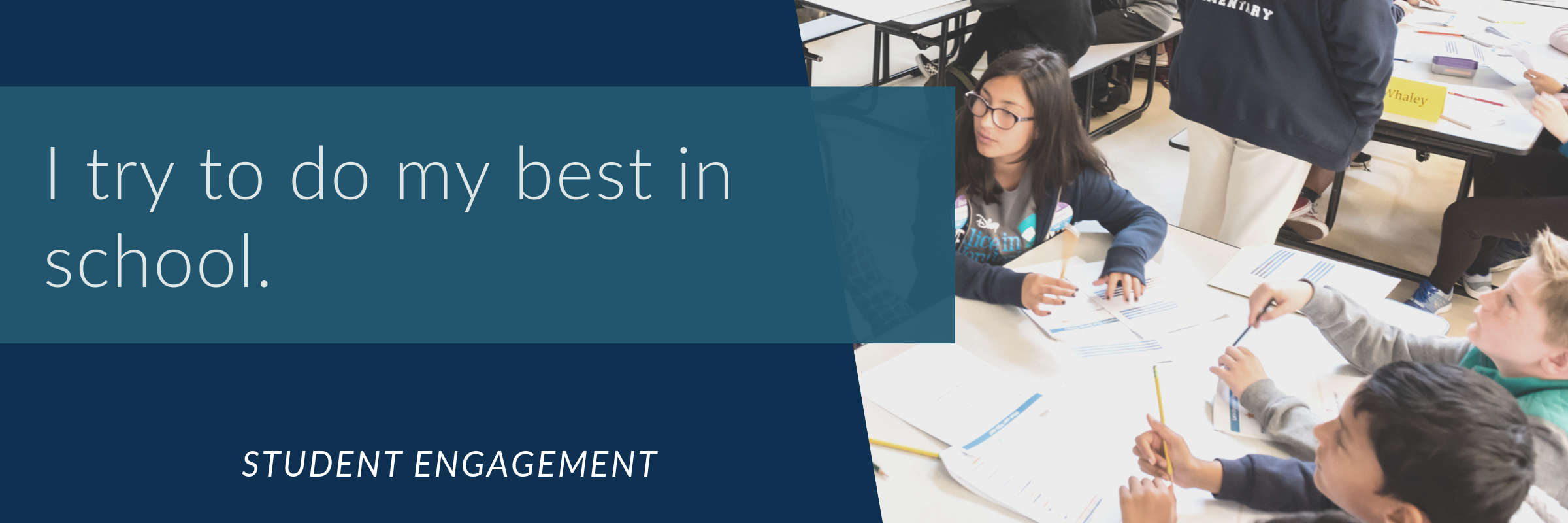
Why does it matter?
The question “I try to do my best in school” — which students answer on a Likert scale — helps educators gather more insight into how effectively teachers and a schools’ culture motivates students to work hard, push themselves, and own their own learning.
Mindset and Motivation Strategies from Carol Dweck
Research tells us how we can help students thrive in an era of academic standards that do not always factor in the struggles and psychological barriers that stand between some students and deeper learning. Educators have the power to help students feel motivated to do their work and value their own growth — and take on standards such as the Common Core. The Atlantic brings us some helpful tips from Carol Dweck’s 2006 book, Mindset: The New Psychology of Success, to ensure that standards such as these don’t leave any students behind.
Messaging matters: Students’ who perceive their teachers as more invested are more likely to take the extra step
In one experiment detailed in the book, researchers randomly attached sticky notes to students’ essays. The sticky notes read either, “I’m giving you these comments so that you’ll have feedback on your paper” or “I’m giving you these comments because I have very high expectations and I know you can reach them.” The difference in messaging is subtle, but important. The latter note signals a teacher’s investment in the student’s success. Here’s how we know it matters: When given the opportunity to revise their essays, 87 percent of those who received the encouraging note turned in new essays, while only 62 percent of students who received the less encouraging note did so. Students who perceive their teacher feedback as coming from a genuine desire to see them succeed are more likely to be motivated to take the extra step. How can we talk to students in a way that frames their work in a growth mindset? More deliberate messaging can help motivate students to do their best in school.
It’s OK to teach students about growth mindset explicitly
In another study detailed in Dweck’s book, a math class working on fractions was divided into groups of five. For each group, the activity they were about to embark on was described differently. One group was told: “Some of these problems are hard, so just do your best.” A second group was told random scientific facts including the weights of humans and elephant brains. A third group was told: “Remember, the more you practice, the smarter you become.” And, finally, a fourth group received messaging similar to “the more you practice, the smarter you become” with a link to an article about “growing one’s brain.” There was also a control group that received no message. It turns out that students who were given one of the growth-mindset messages mastered new math concepts at a rate nearly 3 percent higher than those who received a placebo message or no message. When teachers lead with explicit growth mindset messaging, they help students develop a growth mindset and feel more motivated to take on academic challenges.
Praise students when they have done good work to help them see the connection between effort and output
Dweck’s book also describes a series of studies that consider the role that shed light on the role students’ self-esteem can impact the way teachers talk to their students about effort. The studies’ results suggest that low-performing students with possibly low self-esteem are far more likely to be encouraged by the message “You have the capacity to be great if you work hard” rather than more self-image focused encouragement like praising students regardless of their performance. Struggling students need encouragement — but it’s important to stay away from unintentionally encouraging students’ belief that effort doesn’t matter.
